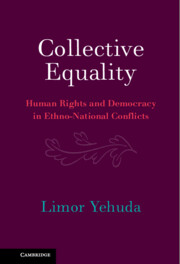Book contents
- Collective Equality
- Collective Equality
- Copyright page
- Dedication
- Contents
- Maps
- Acknowledgments
- 1 Introduction
- Part I Human Rights and Democracy in Deeply Divided Places
- 2 The Politics of Ethno-national Conflicts
- 3 The Limits of Partition
- 4 Limitations of Human Rights
- Part II Revisiting Assumptions
- Part III Collective Equality
- Bibliography
- Index
3 - The Limits of Partition
from Part I - Human Rights and Democracy in Deeply Divided Places
Published online by Cambridge University Press: 20 April 2023
- Collective Equality
- Collective Equality
- Copyright page
- Dedication
- Contents
- Maps
- Acknowledgments
- 1 Introduction
- Part I Human Rights and Democracy in Deeply Divided Places
- 2 The Politics of Ethno-national Conflicts
- 3 The Limits of Partition
- 4 Limitations of Human Rights
- Part II Revisiting Assumptions
- Part III Collective Equality
- Bibliography
- Index
Summary
Chapter 3 explores the social conditions and normative constraints that influence the achievements that can be obtained through partition. The chapter’s main argument is that although novel ideas for “homogenizing” territories may arise, a reasonable theory for peace must assume that forcible transfers of population in any form are prohibited, and consequently that demographically homogenous territories are unattainable. By looking at the social realities in the four cases of Bosnia and Herzegovina, Northern Ireland, Cyprus, and Israel–Palestine, the chapter illustrates that in most actual cases of ethno-national conflict, partition does not offer a viable course of action, if the goal is the creation of ethnically homogenous territories that can become “defensible enclaves” or “true” nation-states. Even in those cases where territorial partition make sense – as in the Israeli–Palestinian conflict, in postdivision Cyprus, or in Bosnia and Herzegovina after the ethnic cleansing – peace must be attained not on the basis of ethnically homogenous nation-states, but rather on the basis of ethnically heterogenous territories and states. Thus, the chapter concludes that while territorial partition may be considered as one tool for peacemaking in ethno-national conflicts, its limitations must be recognized, and attained with other policies for accommodating ethno-national diversity.
Keywords
- Type
- Chapter
- Information
- Collective EqualityHuman Rights and Democracy in Ethno-National Conflicts, pp. 73 - 99Publisher: Cambridge University PressPrint publication year: 2023

